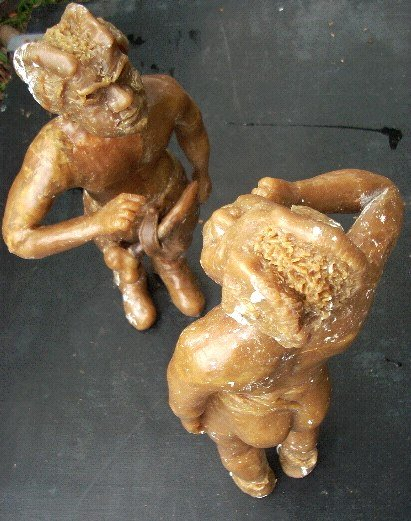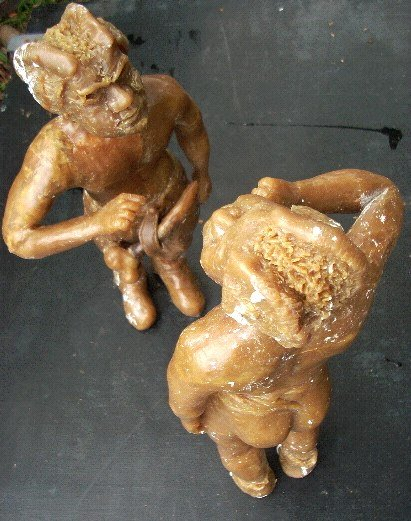
Mapping the gap: Why don’t you use more definition?
When I was learning how to pour molten bronze into lost-wax hollows burnt out from slapped-over investments of plaster, in order to create Consorts to the Mountain Goddess, my teacher in metal Matt Carney would say to me, looking at… my dad-bods

My dad-bod figures of Gog & Magog (from a series of Deloraine Adonides never poured)
“Why don’t you use more definition?”
This was an instruction not a question, nor a ‘crit’.
Matt pointed into the corner of the workshop, where his bronze ¾ life-size archer arose out of no-form. The base hid its grounding purpose with— nothing.
His delineated muscles contracted into beauty, full 4K, while his fully-bent bow aimed an arrow at the sun that desperately tried to find a way into freezing cold damp workshop sinking into South Hobart’s dank rivulet, just down from the Female Factory, itself built in the valley of the shadow of death. The archer waited to be collected by a collector.
Matt was paying off a mortgage, raising a family, by making and selling art. This was remarkable in Tasmania in the noughties.
I watched the archer’s sweat glisten into dollar signs, I wrapped my winter jacket around me more tightly, and nodded to Matt.
<!--insert image of Matt Carney's archer-->
<!-- waiting on email--> <--never arrived-->
<!-- the gap… —will just have to suffice-->
Definitions are an animal thing. We make them in order to make ourselves relaxed and comfortable, safe, sheltered, fed etc.
Beautifully understood. Attractive.
The animal seeks the definition of security. Usage allows adaption with an eye out for danger. Survival requires both security and adaption. We Janus dance between them.
<!--just nod here-->
The glistening sweat of art making the day shine in a cold dark workshop of love.
Success forgets the dance.
This brings us back to mapping, but firstly, to definitions based on negative forms.
A book is not a tree.A tree is not a rock.A rock is not alive.
There is so much to negate.
But even here we use the negative space to hollow out a comfort zone for our intentions. Regularly, habitually, instinctually… —etc. Definition is often the main use of negativity. But definition cannot define away usage, for definition uses usages to define, when defintion is used to mean order, safety, home.
A map is a way to define the world by including the ground as something other than a negative space. You can call this context experience and wisdom.
Definitions will focus on one use to be clear, to resolve the difference, as if the terms used to defined are not likewise distinguished in the same way greatly deferred within the entire system or dictionary of interdependence… so —in order to to be clear here, every word in the dictionary should have its own entry, a different mark, or scar on experience.
This is why neologisms hurt, they are a fresh cut and some cut deep as an arrow. They annoy.
“Why don’t you use more definition?”
A dictionary of defintions, once put together, allows us to see, in a type 2 structuralism, that: all terms in a dictionary require most of the other terms in the dictionary to be already used, and so defined, before the vocabulary can acquit itself. Usages rub and grind against each other, as each word is ground to another word's figure, wriggling away on our tongues. A dictionary is thus defined as a dribble dripping from our jabbering jaws.
In contrast, the grammarian, a hard-nose collector in search of a comfy chair, see each definition in a handy list as a very, very particular object within a proper way to save the world. And not a thing at all.
The grammarian world-builds with a sense of clarity, particularly as the eyes age and degenerate.
Babies don’t care.
The grammarian is an adult who cannot remember how they learned language in the first place, but instead uses an animism of 'meaning' the grammarian selects as the proper spirit, as if they had no bias, and world-building consists mostly in correcting others' poor form.
The grammarians forget the gap when they world-build/correct. (Or, forbid it, perhaps like Whitehead and Russel wanting to ban self-referencing sets in their world-building enterprise Principia Mathematica.)
This forgetry is a common move/mistake/opportunity. The grammarian’s forgetting is a gap of sorts, even as they seek high definition of use, where the measurable outcome in their view is a good resolution, if not agreement. A kind of systematic pyramid energy that builds wonderful things, even when it is wrong, more or less.
Such is the worlding urge when doubled-down into world-building. / The world-building urge is an over-wrought worlding urge.
The worlding urge is a baby, it doesn’t care about correct. Or even correctly correct. Until it does, and over-extends.
The world is a child.
Dictionary languages can wear themselves out.
Teenagers then pick up the pieces and re-purpose them into new uses, like the way worms compost scraps into food for plants. Plants? Or, do I mean adults, food for adults?
People have been complaining about grammarians since at least Sextus Empiricus (early centuries CE). The grammarians hold on the past is a constant hobby for retirement.
For grammarians, like the poor, like empires, are always with us. Successful babies become successful teenagers, become middle-aged Karens, trying to maintain self-respect by attacking all that they were. Their worlding is askew as they engage in worldbuilding, doctrinally pure and dogmatically aligned.
Anyway, to help the grammarian-within here on this blog, below are some 3.1 definitions. They arise in my own movements with regard to the… —gap. Indeed some arose before I venture here to write, and as such indicate the method, the trace, the track how I got so close to nothing.
Thing – this will have it’s own entry/post/book or three --- thing indicates a (composition) movement meeting with another, it is an element of the world.
I am resuscitating old uses recorded in etymologies, where meetings were times appointed to discuss and decide…. things/affairs/matter. Things are decided, agreed, resolved in moving together, belonging in composition.
The negative space for this word 'thing', i.e. what it is not referring to, are those meanings used by classing 'things' as objects (itself defined negatively in relation to subject — except those meanings have reversed their import over time ¸ ugh). I object to 'thing' being use to mean ‘object’. Do so at you own risk as I may get all invert-Karen on your arse. (It's compositional movements all the way down.)World – this is the noun form of worlding and refers to all those things we do/meet/make/agree as we live our lives. It is as mystical as it gets for me. If only because it is nebulous and is why we call soft science well soft. Part of the… —gap for me, that I skirt, lies in its current mystery, and currently, with my current knowledge I suspect is as difficult to explain as consciousness itself, and that they are in direct relation. The self is the world but without the self. That they compose each other is a suspicion I cannot quite suspend. The world does not exist but we world as if we can perceive it. You can also call this hope, or indeed anything you feel like throwing into the gap.
Worldbuilding — orginally I used worldbuilding and worlding a bit interchageably, I now see world-building as a doctrinal form of worlding that gets all dogmatic on some gap-filler, and doubles-down on particular worlding outcomes religion/codes/social-forms.
The… —gap —includes a number of varieties or miscellany of (not)things we don’t know, missing bits, known unknowns, unknown unknowns, systemic incompleteness and aporia. This is not to say they are all the same thing (meeting/s) but that we often treat them the same way (chucking in our favourite preference for mysterious explanations in order to de-gap the world, see above).
This originally apeared on substack.com.
